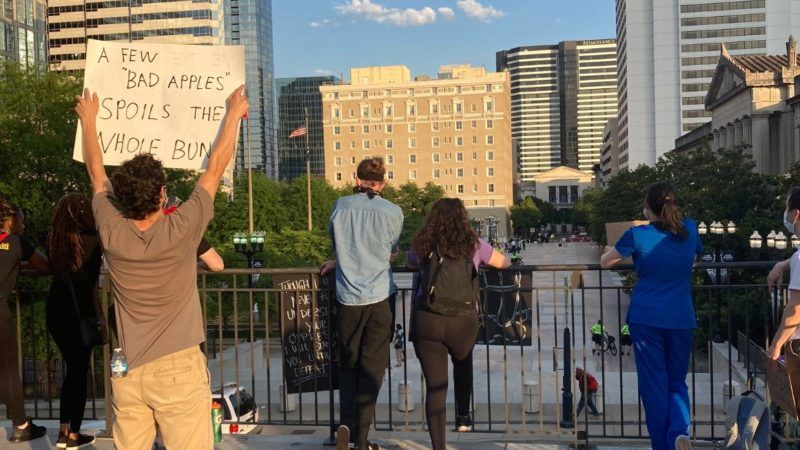Recruitment of Bad Cops Shows How Misconduct Is Deeper Than a Few Bad Apples
Sometimes a "few bad apples" is systemic rot.

The Brevard, Florida, chapter of the Fraternal Order of Police extended an invitation of employment over the weekend to various officers who have been charged with using excessive force amid the national protests sparked by the police killing of George Floyd. The chapter's president, Bert Gamin, is a veteran of the Melbourne Police Department and the Brevard County Sheriff's Office.
"We are hiring in Florida," the invitation said. "Plus…we got your back!"
The invitation was extended to the six Atlanta police officers who were charged with aggravated assault, battery, and criminal damage after brutalizing Messiah Young and Taniyah Pilgrim, two college students who were stuck in traffic during a recent protest in that city. Video (content warning) from the incident captured the moment that the officers attempted to grab the students from the car and arrest them.
Not only did the Atlanta officers cause extensive damage to Pilgrim's vehicle, but they also tased Young and threw both Young and Pilgrim to the ground. At a press conference, Fulton County District Attorney Paul Howard said that the officers initially claimed that Young put the car in reverse and tried to run them over. One officer also claimed that Young and Pilgrim pulled a gun.
Video from the incident, however, told a very different story. In fact, District Attorney Howard used the officers' own body cameras to conclude that Young and Pilgrim had done nothing wrong. "They were so innocent almost to the point of being naive," Howard told the press.
The invitation to join the Brevard Fraternal Order of Police was also extended to the 57 officers who quit the Buffalo Police Department's Emergency Response Team—though not the department itself—after two fellow officers were suspended for pushing a 75-year-old protester to the ground, causing him to sustain a severe head injury. The two officers were later charged with assault.
What all of these incidents reveal is that the problem of police misconduct extends well beyond "a few bad apples."
In fact, outfits like the Brevard Fraternal Order of Police regularly pave the way for bad officers to return to work. In San Antonio, Texas, for example, the police union's contract with the city has resulted in the reinstatement of two-thirds of the officers fired for bad behavior over a 10-year period. A similar story is playing out in Opa Locka, Florida, where the police department has tried at least six times to fire a problematic officer protected by the union.
The fact that video existed of the Atlanta incident made it possible for the district attorney to charge the officers. Had the video not existed, prosecutors would have been forced to rely on the testimony of the officers on the scene who, as previously noted, falsely stated that the college students tried to run them over and had a weapon.
Video of the Buffalo incident, meanwhile, contradicted the police department's initial claim that the 75-year-old protester tripped and fell. As the footage makes clear, the police shoved the elderly man to the ground.
Thankfully, at least one police officer has stepped up to be an example of accountability in recent days.
During the recent George Floyd protests in Fort Lauderdale, Florida, Officer Krystal Smith immediately jumped in to reprimand her colleague, Officer Steven Pohorence, after he shoved a kneeling protester. Pohorence was later suspended, pending an investigation into the incident.


Show Comments (73)